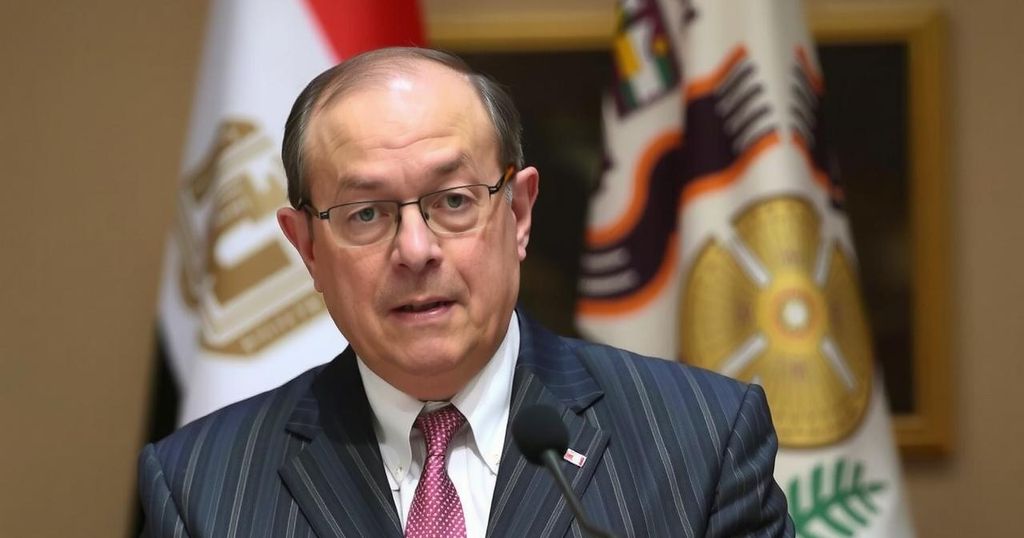Egyptian Foreign Minister Badr Abdelatty’s visit to Syria has been postponed, amid intense media campaigns against Hayat Tahrir al-Sham (HTS). The postponement raises questions about Egypt’s policy towards Syria. Despite state media’s anti-HTS rhetoric, recent communications suggest pragmatic engagement may be in play, reflecting the complexities of Egypt’s foreign policy since the military coup in 2013.
The scheduled visit of Egyptian Foreign Minister Badr Abdelatty to Damascus has been postponed, as reported by Al-Araby Al-Jadeed. This delay has led to increased speculation regarding Egypt’s policy toward Syria, particularly in light of a recent phone conversation between Abdelatty and Syrian transitional government representative Asaad Al-Shibani.
This postponement follows a sustained media campaign in Egypt targeting Hayat Tahrir al-Sham (HTS) and its leader, Ahmed al-Sharaa, improperly referred to as Abu Muhammad al-Jolani in Egyptian state media. Over the past six weeks, state-controlled media outlets have aggressively denounced HTS, branding them as terrorists, which has raised questions about the Egyptian government’s willingness to engage with Syria’s emerging leadership.
The Egyptian media’s narrative, particularly through outlets tied to United Media Services, has been predominantly anti-HTS, issuing stark warnings against any interactions with the group. Despite this, the recent communication between Abdelatty and Al-Shibani was perceived as a potential softening of Egypt’s approach towards Syria.
Former Egyptian Deputy Foreign Minister Ambassador Abdullah Al-Ashaal emphasized the significance of Abdelatty’s engagement but clarified that it does not translate into an endorsement of the new Syrian government. He articulated that the action indicates a practical adaptation to the prevailing conditions in Syria without suggesting a fundamental shift in Egypt’s overarching foreign policy concerning the Syrian crisis.
Since the military coup that ousted President Mohamed Morsi in 2013, President Abdel Fattah Al-Sisi’s administration has maintained a stringent stance against any Islamist affiliations, choosing instead to support the Assad regime, in contrast to Morsi’s previous backing of rebel forces. Sisi’s apparent animosity towards the Syrian transitional government is likely motivated by fears of fostering opposition to his own regime.
Despite HTS being designated a terrorist entity by numerous nations including the United States and European Union member states, the group has refrained from conducting operations outside Syria. Meanwhile, there appears to be a gradual acceptance among Western and regional powers regarding HTS’s role in any future Syrian governance structure.
The context surrounding Egypt’s recent foreign policy actions towards Syria is steeped in a complex history. Following the 2013 coup against President Mohamed Morsi, President Abdel Fattah Al-Sisi’s regime has suppressed any Islamist movements within Egypt, contrasting sharply with Morsi’s support for Syrian rebels. Despite HTS’s controversial standing as a terrorist organization, many regional powers have begun to reconsider their approach, acknowledging HTS’s potential influence in post-Assad Syria. Consequently, Egypt’s media campaign against HTS reflects not only a domestic political posture but also Sisi’s broader strategy to maintain control within his own borders.
In conclusion, the postponement of Foreign Minister Badr Abdelatty’s visit to Syria underscores the delicate balance Egypt seeks to maintain amidst contentious regional politics. While it signals ongoing challenges regarding engagements with Islamist groups, the recent communication with Syria’s transitional government suggests a cautious yet pragmatic approach by Cairo. Moving forward, it remains critical for Egypt to navigate this complex landscape, balancing its domestic narratives with the evolving realities in Syria and the broader Middle East.
Original Source: www.newarab.com






